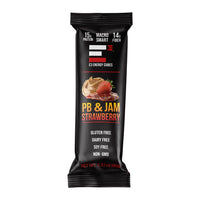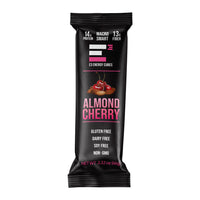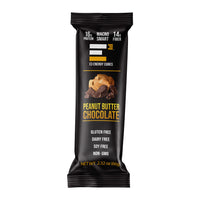When to Eat Protein Bars- A Comprehensive Guide

Protein bars, versatile and convenient snack bars rich in protein, are designed to provide a quick and easy source of nutrients. They are typically made with whey or plant-based protein, nuts, seeds, and dried fruits. Sometimes, premium protein bars are also made with egg and hydrolyzed protein. Their versatility makes them an ideal on-the-go snack for busy individuals, athletes, and fitness enthusiasts. They help support muscle recovery, boost energy levels, and provide a satisfying alternative to less nutritious snacks. Their portability and balanced nutritional profile make them a favored choice for those seeking to maintain a healthy lifestyle. Let us learn all about when to eat them and who would benefit the most from these meal replacement solutions.
Brief Overview Of Different Types Of Protein
Protein bars come in various types to cater to different dietary needs, including gluten-free, dairy-free, and vegan options. Gluten-free bars are suitable for those with gluten intolerance or celiac disease. Dairy-free and vegan bars use plant-based proteins like peas or rice, accommodating lactose-intolerant and vegan consumers.
Nutritional Benefits Of Protein Bars
Protein bars contain essential nutrition for building and repairing muscles, tissues, and cells. Protein supports muscle recovery and growth, making these bars popular among athletes and fitness enthusiasts. They also help maintain a feeling of fullness, aiding in weight management.
Protein Content And Its Importance
Protein content is vital as it supports muscle repair and growth, helps with recovery after exercise, and helps maintain overall health. Adequate protein intake also promotes satiety, aiding in weight management. For athletes and fitness enthusiasts, protein bars provide a convenient source of essential amino acids for optimal performance and recovery.
Other Nutrients Commonly Found In Protein Bars
Many bars contain protein in addition to fiber, vitamins, and minerals. Fiber aids digestion and promotes satiety, while vitamins and minerals support overall health and well-being. Standard inclusions are vitamins B and D, calcium, and iron, contributing to a balanced and nutritious snack option.
Role In Muscle Recovery And Growth
Protein bars play a crucial role in muscle recovery and growth by providing the necessary amino acids to repair muscle tissues after exercise. They help reduce muscle soreness and increase muscle strength and mass, making them an excellent post-workout snack for athletes and those in regular physical activity.
Choosing the Right Protein Bar
It is crucial to have protein bars of superior quality and with superior ingredients. The nutritional benefits, type of protein, and taste help determine the right product. The key is to find a brand that can cater to different taste palettes without compromising on nutritional value:
Factors To Consider While Selecting Protein Bars And Cubes
To reap the maximum benefits from the protein bars, there are several factors to consider while choosing the product:
Reading labels effectively
It's essential to read labels carefully when selecting protein bars and cubes. Check the protein content, ingredient list, and nutritional information. Look for bars with natural ingredients and minimal added sugars.
Different protein sources offer varied benefits. Whey protein is a complete protein, containing all essential amino acids, and is quickly absorbed, making it ideal for muscle recovery. Plant-based proteins, such as pea or rice protein, are suitable for vegans and those with dairy intolerance, providing a sustainable and allergen-free alternative.
Pre-Workout Nutrition- The Role of Protein Bars
Consuming protein bars before exercise provides a convenient energy source, helping to sustain stamina and improve performance. Protein aids in muscle protection during workouts, preventing muscle breakdown and enhancing endurance. It also contributes to a steady release of energy, ensuring consistent performance throughout your exercise session. Consume a protein bar about 30 to 60 minutes before your workout for optimal results. This timing allows your body to digest and absorb the nutrients, providing a steady energy supply and amino acids for muscle support during exercise.
Post-Workout Recovery- Using Protein Bars Effectively
Post-workout, protein bars play a crucial role in muscle repair by providing essential amino acids to rebuild damaged muscle fibers. Consuming protein shortly after exercise accelerates recovery, reduces muscle soreness, and promotes muscle growth, helping you achieve your fitness goals more efficiently.
Importance Of Quick Nutrient Delivery
Quick nutrient delivery is vital post-exercise. Protein bars offer a convenient and fast-absorbing source of protein and carbohydrates, essential for replenishing glycogen stores and initiating muscle repair. Consuming a protein bar within 30 minutes post-workout ensures your muscles receive the nutrients they need promptly.
Recommended Protein-To-Carbohydrate Ratio
A balanced protein-to-carbohydrate ratio, typically around 3:1, is recommended for post-workout recovery. This ratio helps replenish glycogen stores while providing the necessary amino acids for muscle repair. Selecting protein bars with this ratio ensures you’re optimizing recovery and effectively supporting muscle growth.
Meal Replacement Option- Protein Bars as a Substitute

Protein bars can be a convenient meal replacement when you need more time to prepare a full meal. They are instrumental during busy workdays, travel, or post-workout recovery periods. Opt for protein bars designed to provide balanced nutrition comparable to a meal.
When using protein bars as meal replacements, ensure they balance macronutrients—protein, carbohydrates, and healthy fats. Look for bars with fiber, vitamins, and minerals to support overall health. A well-balanced protein bar can help maintain energy and satiety, preventing overeating later.
Protein bars are an excellent snack option, offering a quick energy source and nutrients. They help stabilize blood sugar levels, curb hunger, and boost protein to support muscle maintenance and repair between meals.
Due to their high protein and fiber content, protein bars effectively curb hunger. They provide sustained energy, helping you avoid energy slumps and unhealthy snacking. A protein bar between meals can keep you satisfied and focused throughout the day.
Protein bars and cubes offer unmatched convenience for on-the-go nutrition. They are compact and portable and easy to carry in your bag, car, or office drawer.
How Protein Bars Fit Into A Busy Lifestyle
Protein bars are ideal for a busy lifestyle, offering a quick, nutritious option when time is limited. They provide essential nutrients, including protein, fiber, and healthy fats, to keep you energized and complete throughout the day. Convenient and portable, protein bars can be easily carried in a bag or at your desk, making them perfect for quick meals, snacks between meetings, or post-workout recovery. Their balanced nutrition helps maintain energy levels and supports muscle health, allowing you to stay focused and productive no matter how hectic your schedule gets.
Use Case-Specific Tips For Consuming Protein Bars
As one can have protein bars any time and anywhere, it is essential to understand their effects on different ages, body types, and purpose of consumption. This ensures you can get all kinds of benefits per your body goals. Here are some use cases of protein bars commonly witnessed:
Protein Bars for Weight Management
Protein bars can support weight loss or maintenance by providing a satisfying, low-calorie snack that curbs hunger and controls cravings. Their high protein content helps maintain muscle mass during weight loss and promotes satiety, reducing overall calorie intake throughout the day.
Protein bars as part of a balanced diet
Incorporating protein bars into a balanced diet can help ensure adequate protein intake while providing essential nutrients. They are convenient for busy lifestyles but should complement whole foods like fruits, vegetables, and whole grains for a well-rounded nutritional profile.
Avoid protein bars high in calories and added sugars, hindering weight management goals. Opt for bars with natural sweeteners and minimally processed ingredients to avoid unnecessary calorie consumption and potential spikes in blood sugar levels.
Protein Bars for Specific Dietary Needs
Gluten-free and dairy-free protein bars are available for individuals with celiac disease, gluten intolerance, or lactose intolerance. These bars provide a safe and nutritious option, ensuring that those with dietary restrictions can still enjoy the benefits of protein supplementation.
Vegan and vegetarian protein bars are made with plant-based proteins like peas, rice, or hemp sans any animal products. These bars offer a cruelty-free and environmentally friendly alternative while meeting the protein needs of vegans and vegetarians.
Nut-free and allergy-friendly protein bars are essential for individuals with nut allergies. These bars avoid common allergens, ensuring safe consumption while providing necessary protein and nutrients. Check labels for allergen information to select appropriate options.
Protein Bars and Athletes
Protein bars support athletic training and competition by providing a convenient source of protein and energy. They help muscle repair and recovery, improving performance and endurance during intense physical activities.
Consuming protein bars before or after workouts ensures optimal nutrient delivery. Pre-workout, they provide sustained energy, while post-workout they aid in muscle recovery. Timing intake around training sessions also helps with overall performance and muscle health.
Protein Bars for Muscle Building
Protein bars contribute to muscle synthesis by supplying essential amino acids for muscle repair and growth. Regular intake supports the body's ability to build and maintain muscle mass effectively.
Aim for protein bars with 20-30 grams of protein per serving for muscle growth. This amount aligns with the recommended stimulating muscle protein synthesis intake, especially when combined with strength training exercises.
Combining protein bars with strength training routines assists in muscle-building efforts. Consuming protein bars after workouts provides the necessary nutrients for muscle repair, optimizing gains from resistance training sessions.
Protein Bars for Seniors- Nutritional Support

Adequate protein is required by seniors to maintain muscle mass and overall health. Protein bars offer a convenient way to meet these needs, helping to prevent muscle loss and support daily nutritional requirements.
Protein bars with simple, natural ingredients and a softer texture are more accessible for seniors to digest. These options ensure older adults can comfortably incorporate protein into their diet without digestive discomfort.
Seniors can incorporate protein bars into their daily nutrition by enjoying them as snacks or meal replacements. This approach helps meet protein needs while providing a convenient, tasty option for maintaining a balanced diet.
Protein Bars for Children and Teens- Health Considerations
Protein bars can be safe for children and teens when chosen appropriately. Ensure bars are age-appropriate, free from harmful additives, and used as snacks or supplements, not primary meal replacements.
Select protein bars with lower sugar content for children and teens to promote healthy eating habits and prevent excess sugar intake. Look for bars sweetened with natural ingredients like fruits or honey.
Parental guidance is crucial when incorporating protein bars into children's diets. Parents should choose nutritious options, monitor consumption, and ensure bars complement a well-balanced diet to support healthy growth and development.
Protein Bars and Health Conditions- Medical Considerations
For diabetes management, select protein bars with low glycemic index ingredients to avoid blood sugar spikes. Look for bars high in protein and fiber but low in added sugars and refined carbohydrates.
Protein bars with low sodium content support heart health. Opt for bars with heart-healthy ingredients like nuts, seeds, and whole grains, and avoid those with high salt levels to maintain cardiovascular health.
How to Incorporate Protein Bars into Your Diet
Incorporating protein bars into your diet is simple and convenient. Enjoy them as a quick breakfast option on busy mornings or as a nutritious snack between meals to curb hunger and maintain energy levels. Use protein bars as a post-workout recovery snack to support muscle repair and growth. They can also serve as a meal replacement when you're on the go, ensuring you still get essential nutrients. Choose bars that align with your dietary needs and preferences, such as gluten-free, dairy-free, or vegan options, to integrate them into your daily nutrition plan seamlessly.
Frequently Asked Questions (FAQs) About Protein Bars
The best times to eat protein bars are pre-workout for sustained energy, post-workout for muscle recovery, or between meals to curb hunger. They can also serve as a convenient breakfast option on busy mornings.
Yes, protein bars can be suitable for weight loss. They help control hunger and provide a satisfying, low-calorie snack option. For the best results, choose bars with high protein and fiber content and minimal added sugars.
Protein bars can occasionally replace meals, especially when you’re short on time, but they should not replace whole meals entirely. A balanced diet with whole foods is essential for comprehensive nutrition and long-term health.
Protein bars offer a convenient, portable option that provides additional fiber and other nutrients, while protein shakes are quicker to digest and can be customized for specific nutritional needs. Depending on personal preferences and dietary goals, both can be effective for protein supplementation.
If not chosen carefully, consuming protein bars daily can lead to excessive intake of added sugars and artificial ingredients. It’s important to select bars with natural ingredients and balance them with whole foods for a well-rounded diet.
Wrapping Up
Protein bars offer numerous benefits, including convenience, muscle support, and aiding in weight management. They can be used pre- or post-workout as meal replacements or nutritious snacks. Choose bars with natural ingredients, balanced macronutrients, and minimal added sugars for maximum nutritional benefits. Experiment with different types and flavors to find what suits your lifestyle and dietary needs best. Check out the extensive range of premium E3 Energy Cubes in various flavors, perfect for any occasion.







Leave a comment